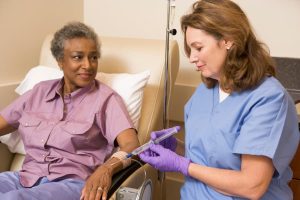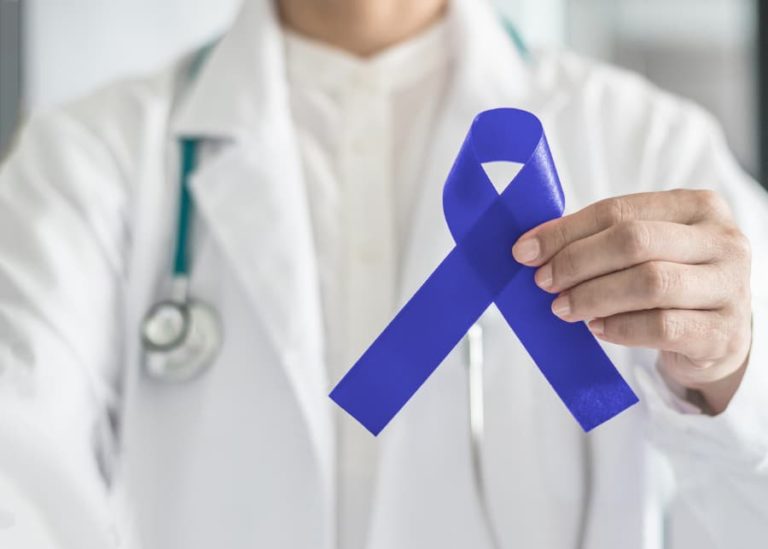
Immunotherapy for Colon Cancer Treatment
If you or a loved one has been diagnosed with colon cancer, identifying the treatment approach that’s best for you and your particular circumstances is
HIPAA Alert: Potential Data Breach Learn More
Questions on Oncology, Hematology and/or Infusion Clinical Services due to COVID-19 Crisis – CALL 833-698-1623
Important Information for Our Patients Regarding the Coronavirus.
RCCA Providing Area Cancer Patients with Access to Care During Coronavirus Outbreak
RCCA Offering Patients Virtual Visits During Coronavirus Pandemic
If you or a loved one has been diagnosed with colon cancer, navigating your treatment options may seem overwhelming. But it doesn’t have to be when you put your care in the hands of Regional Cancer Care Associates. With many surgical and nonsurgical colon cancer treatment methods available, you’ll benefit from the latest innovations in colon cancer care at one of our 30 state-of-the-art facilities.
Here’s a breakdown of what your treatment plan for colon cancer could entail.
Most patients with colon cancer receive some form of surgery, which is also regarded as one of the most effective treatment methods. There are many different kinds of colon cancer surgery, and which procedure you receive will depend on the location and stage of your colon cancer. Our highly qualified and experienced team of specialists at Regional Cancer Care Associates will determine which of the following types of colon cancer surgery are ideal for your case:

Radiation therapy, another common colon cancer treatment, is typically used in conjunction with surgery and other treatment methods. With high-energy rays that destroy cancer cells, radiation is typically localized to the affected areas so that cancer cells stop growing or splitting off into more new cancer cells. Several types of radiation therapy are offered at Regional Cancer Care Associates depending on your particular case, including:
Though each case is different, chemotherapy will likely be a part of many patients’ colon cancer treatment plan. Also known as “chemo,” it involves use of powerful drugs that attack and kill cancer cells, stop cancer from spreading, eliminate cells that have spread to other areas of the body, and relieve pain and other secondary effects of colon cancer. Chemotherapy also can be used to shrink tumors prior to surgery or radiation, and to kill leftover cancer cells from past treatments and fight off cancer if it returns.

A more recent development in colon cancer treatment is targeted therapy, which deploys special medications directly to the targeted cancer cells. Part of an emerging field of precision medicine, targeted therapy disrupts cancer development and prevents cancer cells from growing. Whereas other treatment methods can affect healthy cells, targeted drugs are attracted specifically to cancer cells and often have no negative consequences on healthy cells. Some medications that may be used in targeted therapy include monoclonal antibodies and small-molecule drugs.
As cancer cells diminish the fighting powers of the body’s immune system, immunotherapy aims to strengthen the immune system and give it the power it needs to fight off cancer. If recommended as part of your colon cancer treatment plan, immunotherapy may include:
No matter where your colon cancer is located or what stage it’s in, the oncology physician network of Regional Cancer Care Associates is here to fight the battle with you. We will devise an individualized colon cancer treatment plan that may involve a combination of any of the above methods. Learn more by scheduling an appointment at one of our 30+ locations across New Jersey, Maryland and Connecticut, or contact us today with any questions or concerns.

If you or a loved one has been diagnosed with colon cancer, identifying the treatment approach that’s best for you and your particular circumstances is

Some symptoms of colon cancer may not be easy to diagnose. Read about the more uncommon symptoms on Regional Cancer Care Associates’ online blog.

Colon cancer continues to be one of the most common cancer types diagnosed in men and women in the United States. The American Cancer Society

Regional Cancer Care Associates is one of fewer than 200 medical practices in the country selected to participate in the Oncology Care Model (OCM); a recent Medicare initiative aimed at improving care coordination and access to and quality of care for Medicare beneficiaries undergoing chemotherapy treatment.